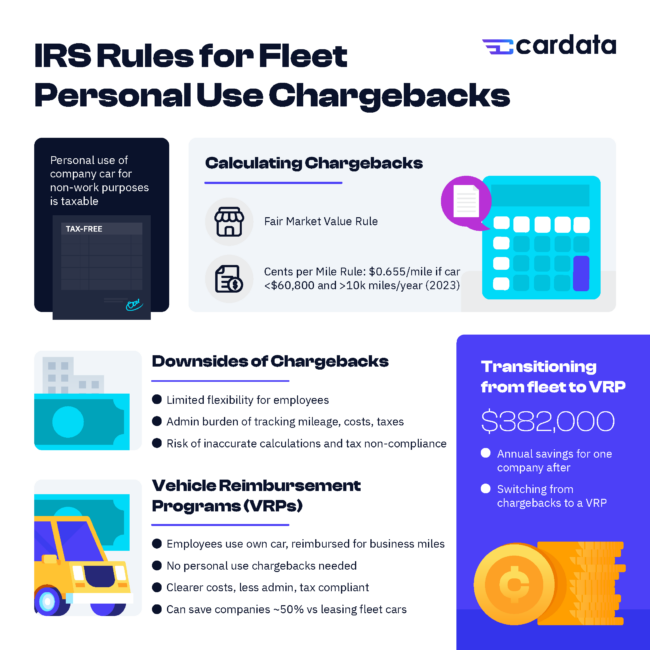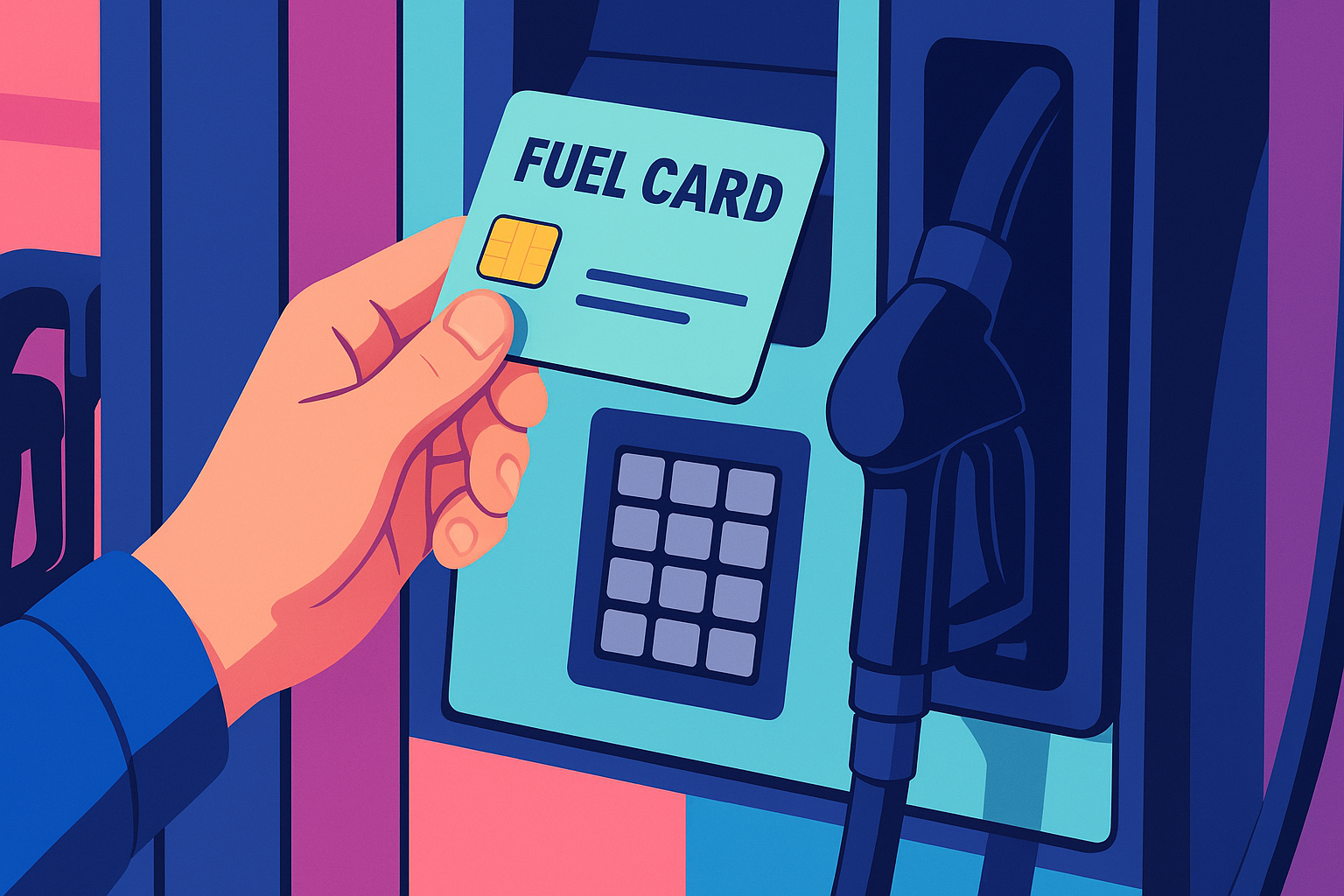Speak to an Expert
Book a CallIntroduction
When an employee takes a company car out for a spin after work hours, the company is obliged to track these miles spent driving and the cost is taxable by the IRS. Accurately recording miles driven and costs incurred by employees for personal driving uses can be challenging to get right.
While mileage recording and chargebacks, when done correctly, are IRS-compliant, it is easy for a company to err creating tax non-compliance and sometimes, employee resentment. This article covers the specifics of IRS rules for fleet personal use chargebacks and suggests that vehicle reimbursement programs can reduce admin costs and tax risks caused by relying on employee mileage tracking and chargebacks for personal use of company cars.

What are Personal Use Chargebacks for Company Cars?
EideBailly notes[1] that personal use of a company vehicle for non-work-related purposes qualifies as a taxable perk, and lists some examples of a company vehicle for personal use, including when: an employee regularly uses the vehicle to commute between home and work, if a trip is unrelated to the company’s purpose, if it’s used on the weekend or on vacation, and if it’s used by a non-employee. Employers use personal use chargebacks so that the revenue gathered can be taxed following standard IRS rules for fleet vehicles. Expenses from company-owned vehicles used for business purposes are non-taxable, while any expenses from personal use are.
Personal use of a company car is a benefit for employees but many also have concerns about the perk. Further, personal use of company cars can also be a major challenge for employers. Personal use chargebacks mean that an employee is frequently using a company car for personal use. While this is a perk, some people would prefer to save the money that they have to give with the chargeback for themselves, so that they could reinvest that money in their own personal-use vehicle. Instead of saving $150–$200 a month to put to use towards their own vehicle, they are instead stuck paying for a company vehicle that might not meet all their needs.
Another challenge is the administration, and risk of tax non-compliance, or over-payment for employee chargebacks. There is significant admin work required to regulate personal use chargebacks, including keeping track of mileage and calculating standby costs, then keeping track of employee payments and taxation. While employees may not like to keep track of their mileage and chargeback fees, ambiguity about chargeback fee costs can also mean that an employee can also feel that their company is charging too much in their chargeback fee. Tax non-compliance can also occur if personal use mileage is tracked incorrectly, resulting in tax non-compliance.
IRS Rules and Regulations on Personal Use Chargebacks
The IRS has guidelines for calculating and reporting personal use charges for company cars, and it’s important to follow these rules to ensure tax compliance. According to the IRS, personal use chargebacks are calculated using either the fair market value rule or the Cents per Mile rule.
The fair market value of a vehicle is how much a vehicle would cost if it were sold on the free market. If the employee were to buy or lease the vehicle themselves in an arms-length transaction, that is the fair market value. It is not the actual costs that the company incurs in order to provide the benefit to the employee.
The Cents per Mile rule is where you calculate an employee’s personal use mileage and then multiply it by the IRS standard rate which in 2023 is 65.5¢ per mile. Two rules apply before you are able to calculate the value of the benefit based on the Cents per Mile rule:
- The vehicle cannot cost more than $60,800 (this value updated yearly)
- The vehicle must be driven 10,000 miles or more during the year.
If both those conditions apply, you can calculate the personal use chargeback based on the Cents per Mile rule.
Employee personal use of company vehicles is reported on Form W-2. Employers must ensure that their employees are remaining compliant with IRS regulations in terms of tracking and reporting the operating costs and standby rate for personal use of company cars.
Sources:
IRS Rules for Personal Use of Employer-Provided Vehicles – Blue & Co., LLC
Further reading: IRS Rules for Mileage Reimbursements
The Downsides of Personal Use Chargebacks
There are a few downsides associated with personal use chargebacks that have to do with the limited flexibility caused by making a driver use a company car and the time and effort required to track and calculate mileage and costs. While company cars are usually presented as a perk of the job, the need to manage the car and its expenses can sometimes also feel like a hassle for employees. Employees often prefer to use their own car during non-work hours. However, the chargeback costs of driving a company car off-hours can cut into funds for their personal car.
This leads us to the other downside of personal use chargebacks: the admin created for the employer affecting both time and cost. Making sure that personal use of company cars is recorded properly, that chargebacks are calculated and paid, and that taxes are correctly filed requires significant work and can detract from other responsibilities and core priorities of a business. Complexities can happen if chargebacks are calculated incorrectly, creating employee dissatisfaction and tax non-compliance. The inflexibility, admin work, and risk of incorrect chargeback calculated can lead to decreased employee morale.
Advantages of Vehicle Reimbursement Programs Over Company Cars with Personal Use Chargebacks
Vehicle Reimbursement Programs or VRPs are tax programs that eliminate the need for a company fleet and ensure tax compliance. With VRPs, employee personal chargebacks are eliminated because the employee is using their own car for business. Therefore, rather than calculate personal miles driven and standby costs for chargebacks, employees via VRP instead calculate their miles and expenses when they are driving for business, and are reimbursed by their company for that business expense.
This alternative system eliminates ambiguous costs and hassle of reimbursement by the employee to the company. Instead, VRPs just use the business mileage tracked and submitted to reimburse employees for their expenses. The clear operating and mileage costs create a fair reimbursement system, with taxation easily offset for business use.
Cardata calculates that the transition from owned or leased company car vehicles to a VRP program can save companies nearly 50% in related expenses annually. That’s because the company isn’t spending on leased vehicles and has fewer admin costs. Also, any missed expenses related to personal use or those unaccounted for by a car leasing company are avoided.
A great success story of the transition to a VRP is a data capture and ID solution provider that manages to save $382,000 annually. This company initially used personal use chargebacks but switched their to Cardata’s Fixed and Variable Rate Reimbursement program. The transition created huge time savings for the HR department as mileage tracking and cloud reporting and pay systems were implemented.
Cardata has four VRP programs alongside mobile and Cloud software that can be hybridized to create a solution to company fleets and personal use chargeback systems.
Conclusion
While personal use of a company car sounds like a privilege, it can ultimately create a headache for employees and companies taking up lots of work and time. Personal use chargebacks are commonly used by companies to charge employees for the personal use of a company vehicle and to offset some of the revenue that is taxed by the IRS for when an employee drives a company car for personal use. Employees must track and submit personal use mileage to remain tax-compliant. As we’ve explained, recording and processing this information can create a lot of work for drivers and HR.
While underreporting this information to remain compliant with IRS tax rules is illegal, overestimating chargeback costs can create resentment with employees. VRPs can be a solution that mitigates risk and cost connected with company fleets and also creates transparency for your employees. Cardata’s VRP programs like FAVR can help your company save funds caused by personal use chargebacks. To learn more, book a demo with us today.
Sources:
[1] Personal Use of Company Vehicle Reporting Methods
Is Your Personal Use Chargeback Too Low? – Operations – Automotive Fleet
Disclaimer: Nothing in this blog post is legal, accounting, or insurance advice. Consult your lawyer, accountant, or insurance agent, and do not rely on the information contained herein for any business or personal financial or legal decision-making. While we strive to be as reliable as possible, we are neither lawyers nor accountants or agents. For several citations of IRS publications on which we base our blog content ideas, please always consult this article: https://www.cardata.co/blog/irs-rules-for-mileage-reimbursements. For Cardata’s terms of service, go here: https://www.cardata.co/terms.
Share on:



